Yamaha RHINO 450, RHINO Manual
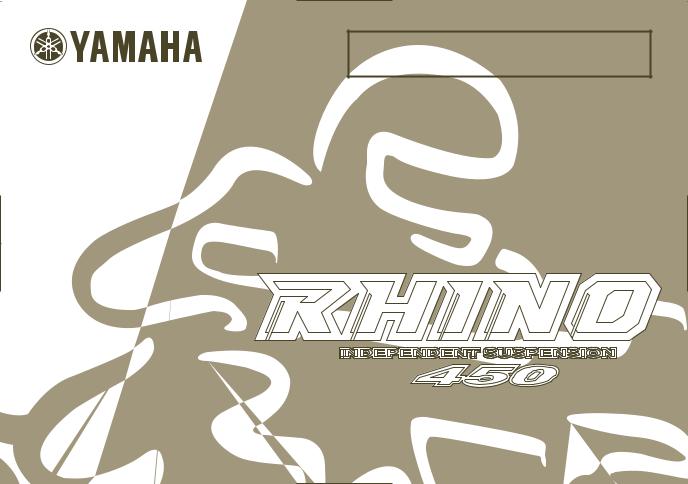
 READ THIS MANUAL CAREFULLY!
READ THIS MANUAL CAREFULLY!
It contains important safety information.
OWNER’S MANUAL
YXR45FX
LIT-11626-21-21 |
2P5-F8199-12 |


INTRODUCTION
Congratulations on your purchase of the Yamaha YXR45FX. It represents the result of many years of Yamaha experience in the production of fine sporting, touring, and pace-setting racing vehicles. With the purchase of this Yamaha, you can now appreciate the high degree of craftsmanship and reliability that have made Yamaha a leader in these fields.
This manual will provide you with a good basic understanding of the features and operation of this vehicle. It also includes basic maintenance and inspection procedures. If you have any questions regarding the operation or maintenance of your vehicle, please consult a Yamaha dealer.

 WARNING
WARNING
Please read this manual carefully before operating this vehicle. Do not attempt to operate this vehicle until you have attained adequate knowledge of its controls and operating features. Regular inspections and careful maintenance, along with good operating techniques, will help ensure that you safely enjoy the capabilities and reliability of this vehicle.

IMPORTANT MANUAL INFORMATION
FAILURE TO FOLLOW THE WARNINGS CONTAINED IN THIS MANUAL CAN RESULT IN SERIOUS INJURY OR DEATH.
Particularly important information is distinguished in this manual by the following notations:
This is the safety alert symbol. It is used to alert you to potential personal injury hazards. Obey all safety messages that follow this symbol to avoid possible injury or death.
WARNING |
A WARNING indicates a hazardous situation which, if not avoided, |
|
could result in death or serious injury. |
||
|
NOTICE |
A NOTICE indicates special precautions that must be taken to |
|
avoid damage to the vehicle or other property. |
|
|
|
|
TIP |
A TIP provides key information to make procedures easier or clearer. |
|
|
*Product and specifications are subject to change without notice.

IMPORTANT NOTE ABOUT USE
●This vehicle is designed and manufactured for off-road use only. Use on public streets, roads, or highways is not only illegal in most areas, it also increases the risk of an accident involving other vehicles. This vehicle does not meet federal motor vehicle safety standards for on-road use.
●Check the laws and regulations in force before choosing where to operate this vehicle. It is illegal to operate this vehicle on public lands where vehicles its size are prohibited.
●This vehicle complies with almost all state off-highway noise level and spark arrester laws and regulations.
YXR45FX
OWNER’S MANUAL
©2007 by Yamaha Motor Corporation, U.S.A.
1st edition, July 2007
All rights reserved. Any reprinting or unauthorized use without the written permission of
Yamaha Motor Corporation, U.S.A. is expressly prohibited. Printed in U.S.A.
P/N LIT-11626-21-21

1
2
3
4
CONTENTS |
|
|
Fuel level check window................ |
4-15 |
|
|
|
Starter (choke) .............................. |
4-15 |
LOCATION OF THE WARNING |
|
|
Doors.............................................. |
4-16 |
AND SPECIFICATION LABELS |
....... 1-1 |
|
Seats.............................................. |
4-16 |
|
|
|
Seat belts ....................................... |
4-17 |
SAFETY INFORMATION.................. |
2-1 |
|
Glove compartment ....................... |
4-18 |
|
|
|
Cargo bed ...................................... |
4-18 |
DESCRIPTION ................................. |
3-1 |
|
Front and rear shock absorber |
|
|
|
|
adjustment ................................... |
4-20 |
INSTRUMENT AND CONTROL |
|
|
Trailer hitch bracket and |
|
FUNCTIONS ..................................... |
4-1 |
|
receiver ........................................ |
4-22 |
Main switch...................................... |
4-1 |
|
Auxiliary DC jack............................ |
4-22 |
Indicator and warning lights ............ |
4-2 |
|
|
|
Indicator and warning lights |
|
FOR YOUR SAFETY – |
|
|
|
5 |
|
||
(Special Edition models) |
4-5 |
|
PRE-OPERATION CHECKS |
5-1 |
|
||||
Multi-function meter unit |
|
|
Front and rear brakes ...................... |
5-3 |
(Special Edition models) ............... |
4-7 |
|
Fuel .................................................. |
5-4 |
Switches ........................................ |
4-10 |
|
Engine oil ......................................... |
5-6 |
Accelerator pedal .......................... |
4-12 |
|
Coolant............................................. |
5-7 |
Brake pedal ................................... |
4-12 |
|
Final gear oil .................................... |
5-7 |
Parking brake lever ....................... |
4-13 |
|
Differential gear oil ........................... |
5-7 |
Drive select lever........................... |
4-14 |
|
Accelerator pedal............................. |
5-8 |
Fuel tank cap................................. |
4-14 |
|
Seat belts ......................................... |
5-8 |

|
Steering........................................... |
5-8 |
|
|
Fittings and fasteners...................... |
5-8 |
|
|
Lights............................................... |
5-9 |
|
|
Switches.......................................... |
5-9 |
|
|
Control cables ................................. |
5-9 |
|
|
Tires ................................................ |
5-9 |
|
|
OPERATION |
6-1 |
|
6 |
|||
Engine break-in |
6-1 |
||
|
|||
|
Starting a cold engine ..................... |
6-2 |
|
|
Starting a warm engine................... |
6-5 |
|
|
Warming up..................................... |
6-5 |
|
|
Drive select lever operation and |
|
|
|
reverse driving............................... |
6-6 |
|
|
On-Command four-wheel-drive |
|
|
|
switch and differential gear lock |
|
|
|
switch ............................................ |
6-8 |
|
|
Parking .......................................... |
6-10 |
|
|
Loading ......................................... |
6-11 |
|
|
BASIC GUIDE FOR SAFE USE |
7-1 |
|
7 |
|||
KNOW YOUR VEHICLE |
7-1 |
||
|
|||
|
Driver requirements ........................ |
7-2 |
Passenger requirements ................. |
7-3 |
Occupant protection system............ |
7-4 |
Protective structure.......................... |
7-5 |
Seat belts......................................... |
7-6 |
Doors ............................................... |
7-8 |
Passenger handholds...................... |
7-9 |
Seat and hip restraints .................. |
7-10 |
Floorboard ..................................... |
7-10 |
Steering wheel............................... |
7-11 |
LEARNING TO OPERATE |
|
YOUR VEHICLE.......................... |
7-12 |
Personal protective equipment...... |
7-12 |
Practice for new Rhino users ........ |
7-13 |
Getting ready to ride ...................... |
7-14 |
Turning........................................... |
7-14 |
Accelerating................................... |
7-15 |
Braking........................................... |
7-16 |
Engine braking............................... |
7-16 |
Leaving the vehicle........................ |
7-16 |
Parking on a flat area .................... |
7-17 |
Parking on a slope......................... |
7-17 |
Loading .......................................... |
7-17 |

|
Operation on different surfaces |
|
|
|
and terrains.................................. |
7-18 |
|
|
Hills ................................................ |
7-19 |
|
|
Uphill.............................................. |
7-19 |
|
|
Downhill ......................................... |
7-20 |
|
|
Rough terrain................................. |
7-21 |
|
|
Pavement ...................................... |
7-21 |
|
|
Water ............................................. |
7-22 |
|
|
Loose terrain/slippery terrain......... |
7-23 |
|
|
Brush or wooded areas ................. |
7-23 |
|
|
Encountering obstacles................. |
7-24 |
|
|
PERIODIC MAINTENANCE AND |
|
|
8 |
|
||
ADJUSTMENT |
8-1 |
||
|
|||
|
Owner’s manual and tool kit............ |
8-2 |
|
|
Periodic maintenance chart for the |
|
|
|
emission control system................ |
8-4 |
|
|
General maintenance and |
|
|
|
lubrication chart ............................. |
8-5 |
|
|
Hood ................................................ |
8-7 |
|
|
Console ........................................... |
8-9 |
|
|
Engine oil and oil filter cartridge .... |
8-10 |
|
|
Final gear oil .................................. |
8-15 |
Differential gear oil ......................... |
8-17 |
Coolant........................................... |
8-19 |
Axle boots ...................................... |
8-20 |
Spark plug inspection .................... |
8-21 |
Cleaning the air filter elements ...... |
8-24 |
Drive select lever box check |
|
hose ............................................. |
8-29 |
V-belt cooling duct check hoses .... |
8-29 |
V-belt case drain plug .................... |
8-30 |
Cleaning the spark arrester ........... |
8-31 |
Carburetor adjustment ................... |
8-32 |
Idle speed adjustment.................... |
8-33 |
Valve clearance ............................. |
8-33 |
Brakes............................................ |
8-34 |
Front brake pad check ................... |
8-34 |
Rear brake pad check.................... |
8-35 |
Checking the brake fluid level........ |
8-35 |
Brake fluid replacement ................. |
8-36 |
Checking the brake pedal.............. |
8-37 |
Parking brake lever free play |
|
adjustment ................................... |
8-37 |
Brake light switch adjustment ........ |
8-39 |
Cable inspection and lubrication.... |
8-40 |

|
|
Brake pedal and accelerator |
|
|
|
pedal lubrication .......................... |
8-40 |
|
|
Rear knuckle upper and lower |
|
|
|
pivot lubrication ........................... |
8-41 |
|
|
Steering shaft lubrication .............. |
8-41 |
|
|
Wheel removal .............................. |
8-42 |
|
|
Tire replacement ........................... |
8-42 |
|
|
Wheel installation .......................... |
8-43 |
|
|
Battery ........................................... |
8-45 |
|
|
Battery maintenance ..................... |
8-46 |
|
|
Jump-starting ................................ |
8-47 |
|
|
Fuse replacement ......................... |
8-49 |
|
|
Replacing a headlight bulb ........... |
8-51 |
|
|
Headlight beam adjustment .......... |
8-53 |
|
|
Tail/brake light bulb |
|
|
|
replacement ................................ |
8-54 |
|
|
Troubleshooting ............................ |
8-56 |
|
|
Troubleshooting charts ................. |
8-57 |
|
|
CLEANING AND STORAGE |
9-1 |
|
9 |
||
|
A. Cleaning |
9-1 |
|
|
|
||
|
|
B. Storage ....................................... |
9-2 |
10 |
..........................SPECIFICATIONS |
10-1 |
|
|
|
||
|
CONSUMER INFORMATION |
11-1 |
|
11 |
|||
Identification number records |
11-1 |
||
|
|||
|
NOISE REGULATION................... |
11-4 |
|
|
MAINTENANCE RECORD ........... |
11-5 |
|
|
YAMAHA MOTOR |
|
|
|
CORPORATION, U.S.A. |
|
|
|
SIDE × SIDE VEHICLE LIMITED |
|
|
|
WARRANTY................................ |
11-6 |
|
|
YAMAHA EXTENDED SERVICE |
|
|
|
(Y.E.S.) ........................................ |
11-7 |
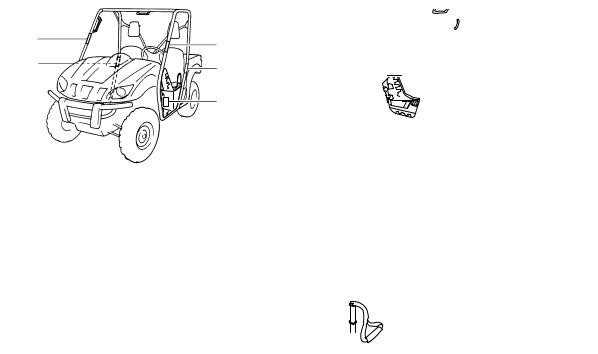
LOCATION OF THE WARNING AND
SPECIFICATION LABELS
5 6
1 |
2 |
|
|
|
|
3 |
3 |
5 |
|
||
|
|
|
|
4 |
|
7
8
1-1
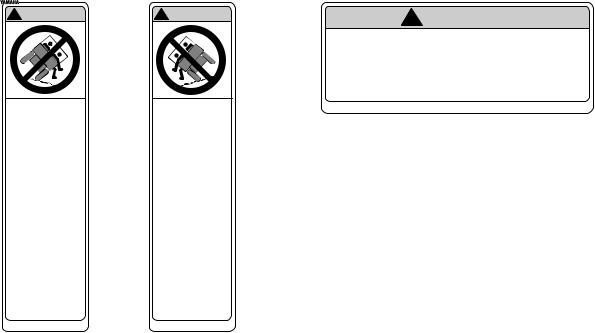
Read and understand all of the labels on your vehicle. They contain important information for safe |
|
and proper operation of your vehicle. |
1 |
Never remove any labels from your vehicle. If a label becomes difficult to read or comes off, a re- |
|
|
|
placement label is available from your Yamaha dealer. |
|
1 2 3
! WARNING |
! WARNING |
Any part of your body (arms, legs, or head) outside of the vehicle can be crushed by the cage/frame.
If you think or feel that the vehicle may tip or roll, brace your feet on the floorboards, and keep your hands on the handholds.
Do not try to stop a vehicle tipover using your arm or leg.
Any part of your body (arms, legs, or head) outside of the vehicle can be crushed by the cage/frame.
If you think or feel that the vehicle may tip or roll, brace your feet on the floorboards, and keep your hands on the steering wheel.
Do not try to stop a vehicle tipover using your arm or leg.
! WARNING
Do not rest hands on door or hip restraint bar. To avoid injury, keep hands completely inside the vehicle by holding the steering wheel or handholds.
YAMAHA |
5B4-K8483-00 |
5B4-K7762-00 |
5B4-K7761-00 |
1-2
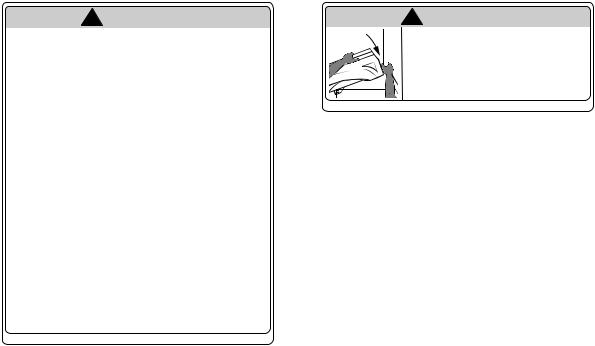
4 5
! WARNING |
|
|
|
! WARNING |
Improper tire pressure or overloading the Rhino may |
|
|
|
Keep hands, body, and other |
|
|
|
people away from pinch points |
|
cause severe injury or death from loss of control or |
|
|
|
|
|
|
|
when lowering bed. Do not hold |
|
rollover. |
|
|
|
|
|
|
|
the cage/frame while closing bed. |
|
|
|
|
|
|
|
|
|
|
|
OPERATING TIRE PRESSURE: Set with tires cold. |
|
YAMAHA |
5B4-K7764-00 |
|
RECOMMENDED: |
|
|
|
|
FRONT: 70kPa, (.70kgf/cm 2), 10psi REAR: 98kPa, (.98kgf/cm 2), 14psi MINIMUM: FRONT: 63kPa, (.63kgf/cm 2), 9psi REAR: 91kPa, (.91kgf/cm 2), 13psi
Never set or allow tire pressure to be below the minimum. Tire may dislodge from rim.
Gross Vehicle Weight Rating: 907 kg (2000 lb) maximum including vehicle, weight of operator, passenger, accessories, cargo, and (if applicable)
trailer tongue weight.
YAMAHA |
5B4-F1696-00 |
1-3
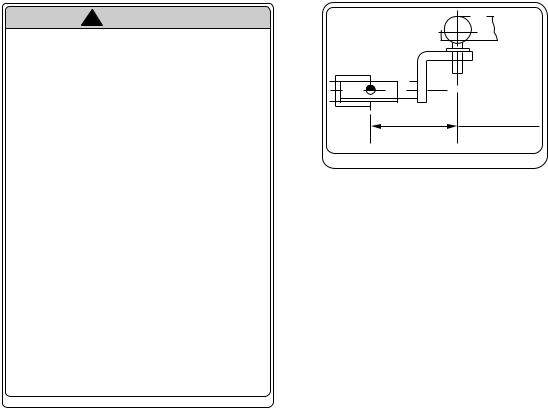
6
! WARNING
Improper use of cargo bed or cage/frame can result in severe injury or death from loss of control, overturn or other accidents.
•Do not carry passengers in cargo bed.
•Maximum load in cargo bed: 181 kg (400 lb).
•Load or trailer may affect handling and stability:
•Secure cargo so that it will not shift – a loose load could change handling unexpectedly or be thrown forward and strike occupants.
•Keep weight in the cargo bed centered side to side, and as low and as far forward as possible. Topheavy loads increase the risk of overturn.
•Do not tow or pull objects from any point other than the trailer hitch bracket or winch (if installed).
•When loaded with cargo or towing a trailer:
•Reduce speed and allow more room to stop.
•Turn gradually and go slowly.
•Avoid hills and rough terrain.
•Read Owner’s Manual before loading, towing, or pulling objects.
YAMAHA |
5B4-F4897-00 |
7
MAX 7.3 INCH
(185MM)
YAMAHA |
5UG-F151J-00 |
1-4
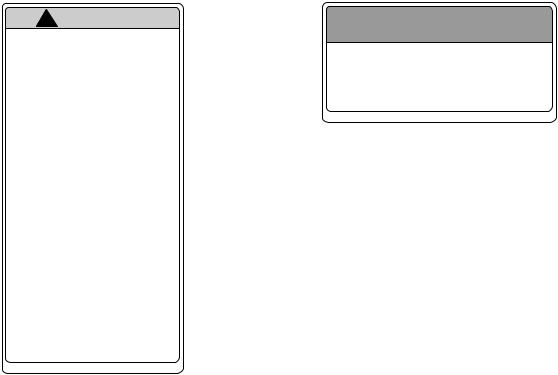
8
! WARNING
Improperly loading a trailer or pulling an object can affect handling, stability, and risk of overturn or other accidents.
Secure load to prevent it from shifting.
Never load more than 50 kg (110 lb) tongue weight on the towing bracket.
Do not tow more than 550 kg (1212 lb) rolling weight (trailer plus cargo).
Tow or pull only from hitch bracket.
Read Owner s Manual before loading, towing, or pulling objects.
YAMAHA |
5B4-F151K-00 |
9
Head to Toe
Safety Checklist
üHead Helmet and eye protection.
üBody Seatbelt and protective clothing.
üHands Inside vehicle and holding the
handholds or steering wheel. ü Feet On floorboard, ready to brace,
and door closed.
YAMAHA |
5B4-F1558-00 |
1-5
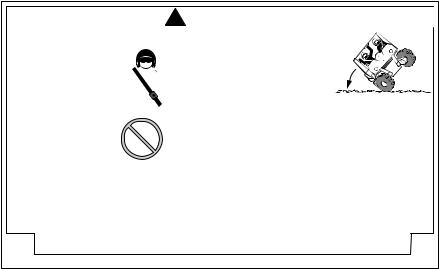
0
|
|
|
! WARNING |
|
|
|
To reduce risk of accidents and injury or death: |
|
|
||||
Be Prepared |
|
|
Avoid Rollovers and Crushing Injuries |
|
|
|
• Wear seat belt, motorcycle helmet, |
|
|
• Use care when turning: |
|
|
|
eye protection and protective gear. |
|
|
o Turning the steering wheel too far or too fast |
|
|
|
• Keep your body completely inside |
|
|
|
|
||
|
|
can result in a rollover or loss of control. |
|
|
||
the vehicle at all times. Keep both |
|
|
o Slow down before entering a turn. |
|
|
|
hands on the steering wheel. Be |
|
|
o When making tight turns from a stop or at slow |
Abrupt maneuvers or |
||
|
|
|||||
sure passenger is seated, belted, |
|
|
speeds, avoid sudden or hard acceleration. |
|
||
|
|
|
aggressive driving have |
|||
and holding onto the handholds. |
|
|
o Avoid sideways sliding, skidding, or fishtailing, |
|||
|
|
|
and never do donuts. |
|
caused rollovers – even on |
|
Be Qualified and Responsible |
DRIVER |
• Drive straight up and down inclines, not across |
|
flat, open areas. |
||
• This vehicle is intended for use |
UNDER |
them. If crossing a hill is unavoidable, drive slowly |
|
|||
only by an operator 16 or older |
16 |
and turn downhill immediately if you feel the |
|
|
||
|
Genuine Yamaha Doors and |
|||||
with a valid motor vehicle license. |
vehicle may tip. |
|
||||
|
|
|
|
|||
• Passenger and driver must be able to |
• Avoid paved surfaces. Turn gradually and go |
|
a Handhold/Strap are |
|||
place both feet flat on the floorboard while |
slowly if you must drive on pavement. This vehicle |
available for free installation |
||||
seated upright with their backs against the |
is designed for off-road use only. |
|
or replacement. Yamaha |
|||
seat backs. |
|
|
If you think or feel the Rhino may tip or roll: |
|
recommends these features to |
|
• Do not drive or ride as passenger after |
• Brace yourself by pressing your feet firmly on the |
|
help keep occupants from |
|||
using drugs or alcohol. |
|
|
floorboards and keep a firm grip on the steering |
|
sticking arms or legs out of the |
|
• Do not operate on public roads. |
|
|
wheel or handholds. |
|
vehicle during a rollover. |
|
|
|
• Do not put your hands or feet outside of the |
|
|
||
|
|
|
|
|
|
|
Read the Owner’s Manual |
|
|
vehicle for any reason. |
|
Contact your dealer or visit |
|
|
|
|
|
www.yamaha-motor.com/rhino |
||
|
|
|
|
|
||
YAMAHA |
|
|
|
|
|
5B4-F1568-01 |
1-6

 SAFETY INFORMATION
SAFETY INFORMATION
Be a responsible owner
As the vehicle’s owner, you are responsible for the safe and proper operation of your Rhino. While understanding all parts of this manual are important for vehicle ownership, be sure to read this chapter and the instructions in Chapter 7 before operating the Rhino. Also use these two chapters and the labels on the vehicle to instruct new operators and passengers. Do not allow anyone else to operate your vehicle or ride as a passenger if you are unsure that he/she is willing and able to follow these instructions.
Get to know your vehicle
This off-road vehicle will handle and maneuver differently from cars, ATVs, go-carts, golf-cars and grounds-keeping vehicles. Follow these instructions to reduce your risk of an accident and to reduce the risk of serious injury or death in the event of an accident.
2-1

Before you operate the Rhino
● Prepare yourself and your passenger:
• This vehicle is intended for use only by an operator 16 or older with a valid motor vehicle li-
2
cense.
DRIVER
UNDER
16
•This vehicle is designed to carry the driver and one passenger. Never carry passengers in the cargo bed.
•Both driver and passenger should wear seat belts properly.
•Both driver and passenger must be able to put both feet flat on the floorboard while seated upright with their backs against the seat backs. Passenger must be able to reach and hold the handholds within the cage/frame.
•Both driver and passenger should wear an approved motorcycle helmet that fits properly. Both driver and passenger should also wear eye protection (goggles or a face shield), gloves, over-the-ankle boots, long-sleeved shirt or jacket, and long pants.
•Do not drive or ride as passenger after using drugs or alcohol.
2-2
Prepare your vehicle
Perform the pre-operation checks each time you use the vehicle to make sure it is in safe operating condition. Failure to inspect or maintain the vehicle properly increases the possibility of an accident or equipment damage. See pages 5-1–5-2 for a list of pre-operation checks.
Prepare your load or trailer
Carrying loads, towing a trailer, or pulling objects can affect handling, stability, and risk of overturn or other accidents.
•Read Chapter 6 before loading, towing, or pulling objects.
•Do not overload the vehicle or trailer. Refer to label in cargo bed for cargo bed load limit. Refer to label next to hitch for tongue weight and trailer load limits.
•Keep weight in the cargo bed centered side to side, and as low and as far forward as possible.
•Secure cargo so that it will not shift – a loose load could change handling unexpectedly or be thrown forward and strike occupants.
2-3
While using the Rhino
●Keep your body completely inside the vehicle at all times. Keep both hands on the steering wheel. Be sure passenger is seated, belted, and holding onto the handholds. Close doors before driving. Any part of your body (arms, legs, and head) outside the vehicle can be struck by objects your vehicle is passing or crushed by the vehicle cage/frame in a rollover accident.
●Watch for branches, brush, or other hazards that could enter the vehicle.
●Abrupt maneuvers or aggressive driving, even on flat, open areas, can cause loss of control, including rollovers. The Rhino has higher ground clearance and other features to handle rugged terrain, and, as a result, can overturn in situations where some other vehicles may not.
2-4

●Avoid rollovers:
•Use care when turning:
•Turning the steering wheel too far or too fast can result in a rollover.
•Avoid sideways sliding, skidding, or fishtailing, and never do donuts.
•Slow down before entering a turn and avoid hard braking in a turn.
•When making tight turns from a stop or at slow speeds, avoid sudden or hard acceleration.
2-5
•Drive straight up and down inclines, not across them. If crossing a hill is unavoidable, drive slowly and turn downhill immediately if you feel the vehicle may tip.
•Avoid paved surfaces. Turn gradually and go slowly if you must drive on pavement. This vehicle is designed for off-road use only.
●If you think or feel that the vehicle may tip or roll, keep your body completely inside the protective structure of the vehicle:
•Brace yourself by pressing your feet firmly on the floorboards and keep a firm grip on the steering wheel or handholds.
•Do not put your hands or feet outside of the vehicle for any reason. Your arm or leg could be crushed.
•Do not try to stop a vehicle tipover using your arm or leg.
●Do not operate this vehicle on any public street, road, or highway, even if dirt or gravel.
●Do not operate the vehicle in fast-flowing water or water deeper than 33 cm (13 in). If you must cross shallow, slow-moving water, choose your path carefully to avoid sharp drop-offs, large rocks, or slippery surfaces. Operating this vehicle through deep or fast-flowing water can lead to loss of control or overturn. To reduce your risk of drowning or other injuries, use care when crossing through water.
2-6
●When loaded with cargo or towing a trailer:
•Reduce speed, operate in low gear only, and allow more room to stop.
•Avoid hills and rough terrain. Use extreme caution when towing or carrying a load on inclines.
•Load trailer properly and use extra care when towing or pulling.
●Do not tow or pull objects from any part of the vehicle other than the trailer hitch bracket or winch (if installed).
2-7
Avoid carbon monoxide poisoning
All engine exhaust contains carbon monoxide, a deadly gas. Breathing carbon monoxide can cause headaches, dizziness, drowsiness, nausea, confusion, and eventually death.
Carbon monoxide is a colorless, odorless, tasteless gas which may be present even if you do not see or smell any engine exhaust. Deadly levels of carbon monoxide can collect rapidly and you can quickly be overcome and unable to save yourself. Also, deadly levels of carbon monoxide can linger for hours or days in enclosed or poorly-ventilated areas. If you experience any symptoms of carbon monoxide poisoning, leave the area immediately, get fresh air, and SEEK MEDICAL TREATMENT.
●Do not run engine indoors. Even if you try to ventilate engine exhaust with fans or open windows and doors, carbon monoxide can rapidly reach dangerous levels.
●Do not run engine in poorly ventilated or partially enclosed areas such as barns, garages, or carports.
●Do not run engine outdoors where engine exhaust can be drawn into a building through openings such as windows and doors.
2-8
Genuine Yamaha Accessories
Choosing accessories for your Rhino is an important decision. Genuine Yamaha Accessories, which are available only from a Yamaha dealer, have been designed, tested, and approved by Yamaha for use on your Rhino.
Many companies with no connection to Yamaha manufacture parts and accessories or offer other modifications for Yamaha vehicles. Yamaha is not in a position to test the products that these aftermarket companies produce. Therefore, Yamaha can neither endorse nor recommend the use of accessories not sold by Yamaha or modifications not specifically recommended by Yamaha, even if sold and installed by a Yamaha dealer.
Aftermarket parts, accessories, and modifications
While you may find aftermarket products similar in design and quality to genuine Yamaha Accessories, recognize that some aftermarket accessories or modifications are not suitable because of potential safety hazards to you or others. Installing aftermarket products or having other modifications performed to your Rhino that change any of the vehicle’s design or operation characteristics can put you and others at greater risk of serious injury or death. You are responsible for injuries related to changes in the vehicle.
2-9
Aftermarket tires and rims
The tires and rims that came with your Rhino were designed to match the performance capabilities and to provide the best combination of handling, braking, and comfort. Other tires, rims, sizes, and combinations may not be appropriate. Refer to pages 8-42–8-44 for tire specifications and more information on replacing your tires.
2-10
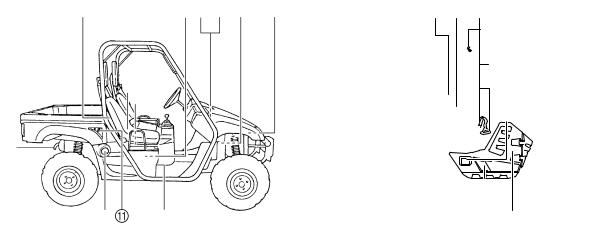
DESCRIPTION
E F G H IJ K L M
D
|
|
|
|
|
O |
|
N C |
|
|
|
|
|
|
||
|
C |
|
|||||
1. |
Headlights |
14. |
Spark arrester |
|
|
||
2. |
Front shock absorber assembly spring preload adjusting ring |
15. |
Passenger seat belt |
|
|
||
3. |
Brake fluid reservoir |
16. |
Passenger seat |
|
|
||
4. |
Air filter elements (engine and air intake duct) |
17. |
Oil filter cartridge |
|
|
||
5. |
V-belt case |
18. |
Passenger handhold |
|
|
||
6. |
Driver seat |
19. |
Engine oil filler cap |
|
|
||
7. |
Driver seat belt |
20. |
Battery |
|
|
||
8. |
Cargo bed |
21. |
Fuses |
|
|
||
9. |
Tail/brake lights |
22. |
Coolant reservoir |
|
|
||
10. |
Rear shock absorber assembly spring preload adjusting ring |
23. |
Radiator cap |
|
|
||
11. |
Cargo bed release levers |
24. |
Fuel level check window |
|
|
||
12. |
Spark plug |
25. |
Fuel tank cap |
|
|
||
13. |
Door |
|
|
|
|
||
3-1
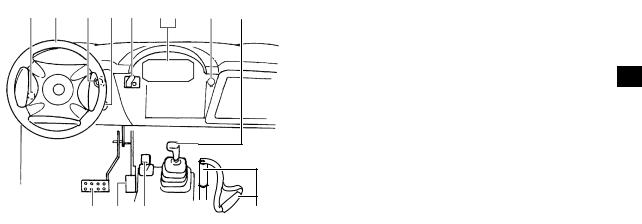
|
The vehicle you have purchased may differ |
P Q R S T UV W X |
slightly from those shown in the figures of this |
|
manual. |
3
[ Z Y |
H |
26.Light switch
27.Steering wheel
28.Starter (choke)
29.Main switch
30.On-Command four-wheel-drive and differential gear lock switches
31.Indicator and warning lights
32.Multi-function meter unit (Special Edition models)
33.Auxiliary DC jack
34.Drive select lever
35.Parking brake lever
36.Accelerator pedal
37.Brake pedal
3-2
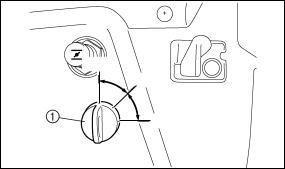
INSTRUMENT AND CONTROL
FUNCTIONS
Main switch
OFF
OFF |
ON |
|
O |
|
|
|
|
|
|
N |
|
|
S |
START |
|
R |
|
|
T |
|
|
A |
|
|
T |
|
1. Main switch
Functions of the respective switch positions are as follows:
ON:
All electrical circuits are supplied with power, and the headlights and taillights come on when the light switch is on.
OFF:
All electrical circuits are switched off. The key can be removed in this position.
START:
The electric starter is engaged by turning and holding the key in this position. Release the key when the engine starts.
4-1
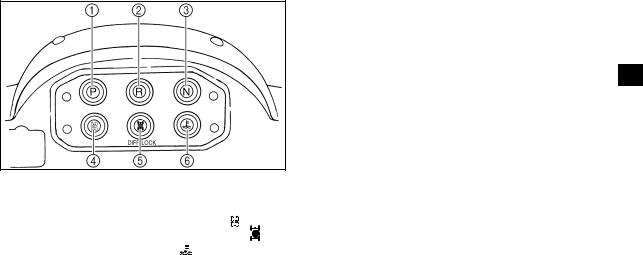
Indicator and warning lights
1. |
Parking brake indicator light “P” |
|
|
||||
2. |
Reverse indicator light “R” |
|
|
||||
3. |
Neutral indicator light “N” |
|
|
||||
4. |
On-Command four-wheel-drive indicator light “ |
|
” |
|
” |
||
|
|
||||||
|
|
||||||
5. |
On-Command differential gear lock indicator light “ |
LOCK |
|||||
|
|
|
|
|
|
DIFF. |
|
6. |
Coolant temperature warning light “ |
|
” |
|
|
||
|
|
|
|||||
Parking brake indicator light “P”
This indicator light comes on when the parking brake is applied.
Reverse indicator light “R”
This indicator light comes on when the drive 4 select lever is in the “R” reverse position. Furthermore, this indicator light flashes when the engine is being raced for 10 seconds or more.
If the indicator light flashes under any other circumstances, have a Yamaha dealer check the speed sensor circuit.
Neutral indicator light “N”
This indicator light comes on when the drive select lever is in the “N” position.
4-2

On-Command four-wheel-drive indicator light “ 


 ”
”
This indicator light comes on when the On-Command four-wheel-drive switch is in the “4WD” position.
Due to the synchronizing mechanism in the differential gear case, the light may not come on until the vehicle starts moving.
On-Command differential gear lock indica-
tor light “ DIFF. ”
LOCK
This indicator light comes on when the On-Command differential gear lock switch is set to the “LOCK” position.
Coolant temperature warning light “ ”
”
If the coolant temperature reaches a specified level, this light comes on to warn that the coolant temperature is too hot. If the light comes on during operation, stop the engine as soon as it is safe to do so and allow the engine to cool down for about 10 minutes.
(See page 8-58.)
NOTICE
●The engine may overheat if the vehicle is overloaded. If this happens, reduce the load to specification.
●After restarting, make sure that the light is out. Continuous use while the light is on may cause damage to the engine.
4-3
